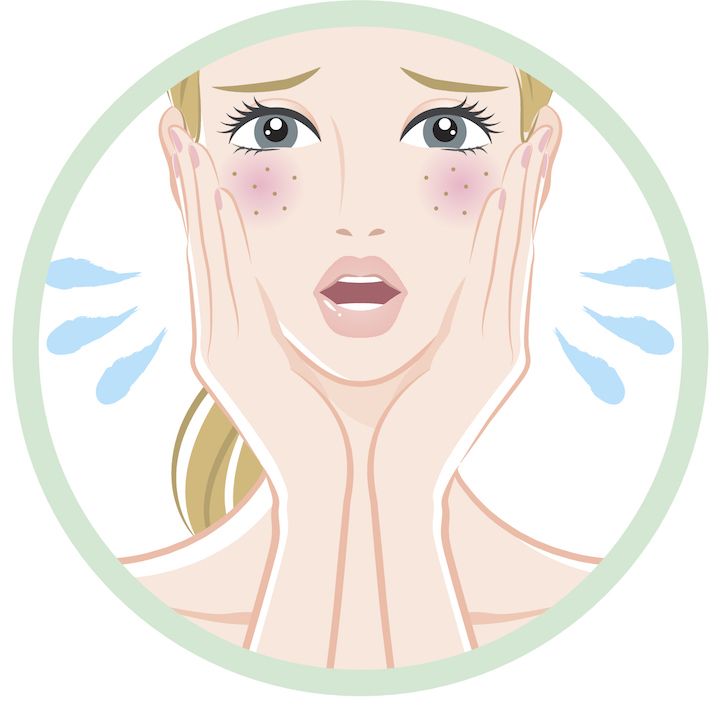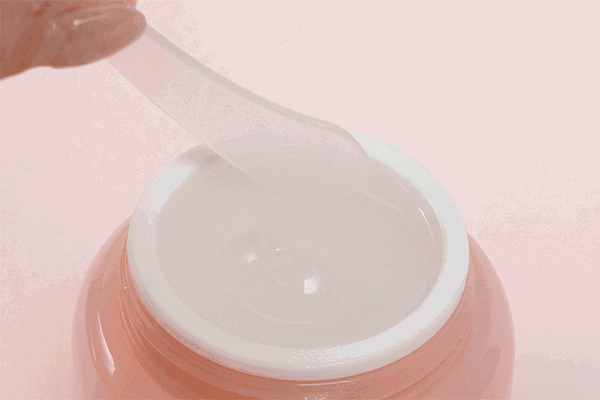Uh, went a little hard on that scrub? Decided to give your face the full acid treatment? Face feeling itchy, red, or sensitive? There are a host of causes for a compromised skin barrier. Thankfully, the fix isn’t hard. Here’s what to do.
If you’ve spent any amount of time browsing all of the skincare haunts (reddit, YouTube, Instagram), you may have heard about a mysterious skincare issue called a “compromised skin barrier.” Sounds scary, right? Well, it doesn’t have to be!
What is the skin barrier
First things first, let’s talk about what your skin barrier actually is. Your skin barrier is that very top layer of skin that’s responsible for protecting your face. Imagine your skin is like Kim Kardashian-West’s house. Your skin barrier is the giant wall surrounding the house, protecting North and Saint and Chi and little baby Psalm from the paparazzi (aka the bacteria, dirt, sweat, and pollution).

Your skin barrier is incredibly important and is the foundation of healthy skin. You’ll know your barrier is healthy when your skin is plump, firm, and smooth — basically the glass/milky skin that everyone is trying to achieve.
How do I know if I have it?
So what does it mean when your barrier is compromised? Well, let’s go back to that Kim K house analogy. The paparazzi have found a hole in the wall and brought in a bulldozer to completely tear the wall down, allowing everyone who has ever worked at TMZ onto the property. Chaos ensues, and basically, it’s a hot ass mess. When your skin barrier is compromised, that top layer of skin is damaged, causing a whole host of problems. What kind?
1. Your skin is super dry, tight, and possibly flaky and inflamed
2. Your skin looks dull and flat
3. Your skin is breaking out all over — and in places where you don’t normally break out
4. Your skin stings and itches when you apply your products

These are all the telltale signs that your skin’s barrier is not a happy camper. What would cause these types of problems? So glad you asked!
So what caused it?
The number one cause? Over-exfoliation. I’ll use myself as an example. Once, I used a high-powered AHA and BHA combo every single day and noticed I just could. Not. Stop. Breaking. Out. So I did the entirely (un)reasonable thing and decided to use the products during my AM AND PM routine, and I broke out even more. I was grasping at straws and realized … oh. My skin barrier was completely f—ked.
But reminder, over-exfoliation is not only caused my chemical exfoliants. Harsh scrubs (like St. Ives, for example) can cause damage to your moisture barrier. Age also weakens your moisture barrier. Has your mom or grandmother ever complained about dry skin? This is why. Also, the more fair-skinned you are, the thinner your barrier is. Alcohol-based toners, essential oils, smoking, dry climates, and long airplane rides can also cause skin barrier damage.

How do I fix it?
Is all hope lost once you’ve compromised your skin barrier? Thankfully, it’s not as bad as you think, and it can be repaired. Follow these steps to get your skin back into tip-top shape.
Step 1:
Stop using any and all actives (AHAs/BHAs/PHAs), harsh high pH cleansers, and scrubs. These can cause further damage to your barrier, and you’re trying to fix it, not make it worse.
Step 2:
Keep it simple. This is not the time to introduce a host of new products. For a considerable amount of time, your routine is going to consist of cleansing (double cleanse at night), a hydrating toner and/or serum, a moisturizer, possibly an oil, and sunscreen during the day. That’s it.

Step 3:
Pick out product ingredients wisely. Not all moisturizers are created equal. A moisturizer can feel super nourishing and heavy, but without the proper ingredients it’s not really healing your skin. Some ingredients to look out for include ceramides, niacinamide, oils including jojoba, sesame, borage, carrot, squalane, cranberry, sweet almond oil, and all forms of vitamin E (aka tocopherol).
Step 4:
Be patient. Damaging your moisture barrier didn’t happen overnight, and it won’t repair itself overnight either. It can take anywhere from two weeks up to a month for your barrier to fully get itself together, depending on how bad the damage was. How will you know that your skin is ready? Look for the signs of a healthy moisture barrier — bouncy, firm, soft, and smooth skin, just like a baby.
Have you ever found yourself with a compromised skin barrier? What did you do to repair it? Let me know in the comments!
Loading...